
New Jersey – A Class Action lawsuit has been filed by the Washington, DC based firm Kirkland & Ellis LLP, which includes form US Solicitor Paul D. Clement, against Kelly Rosen, Pretrial Services Team Leader; Mary E. Colalillo, Camden County Prosecutor, and Christopher S. Porrino, Attorney General of New Jersey – on behalf of Brittan B. Holland, and others yet to be named – for violations of Holland’s 8th and 4th Amendment rights under the US Constitution relating to New Jersey’s Criminal Justice Reform.
Instead, under the CJRA, the court never had the option to set bail, let alone to give Plaintiff Holland the opportunity to post it. Instead, relying on a new “risk assessment tool,” the court concluded that Plaintiff Holland’s appearance could be secured by a set of restrictive non-monetary conditions, including home detention, an electronic monitor that he must wear around his ankle constantly and that tracks his movement 24 hours a day, and a requirement that he report to the pre- trial services office every two weeks—even if it disrupts his job. As a result, Plaintiff Holland’s liberty is sharply curtailed. Among other things, he cannot shop for food or basic necessities and cannot take his son to baseball practice, an important aspect of his custodial responsibilities and his efforts to bond with his child.
Class Action Complaint in FULL here
(excerpt)
Plaintiff Brittan B. Holland, on behalf of himself and all others similarly situated, and Plaintiff Lexington National Insurance Corporation (collectively “Plaintiffs”), bring this action against Defendants Kelly Rosen, Mary Colalillo, and Christopher S. Porrino (collectively “Defendants”), and allege the following:
PRELIMINARY STATEMENT
1. Plaintiff Holland stands accused but unconvicted of a crime. Under bedrock principles of American law, he is presumed innocent. And like all innocent people, he is presumptively entitled to liberty from any pre-trial restraint.
2. For centuries, the mechanism for ensuring a defendant’s liberty from pre-trial restraint was monetary bail. A person accused but unconvicted of a bailable offense could not be subject to any pre-trial deprivation of liberty without the option of bail, unless the government showed that no amount of money would serve the government’s interest in securing the defendant’s future appearance (or, more recently, that detention was necessary to protect the community from danger). Bail is thus a liberty-preserving mechanism as old as the Republic.
3. The availability of bail is enshrined in the Bill of Rights. The Eighth Amendment forbids “[e]xcessive bail,” a protection that presupposes the option of bail. And the vast majority of state constitutions throughout American history, including New Jersey’s, have likewise guaranteed defendants (in all but capital cases) the option of bail before being subjected to pre-trial deprivations of liberty.
4. The option of bail to avoid pre-trial deprivations of liberty no longer exists in New Jersey. Under the Criminal Justice Reform Act (“CJRA”), which took effect January 1, 2017, New Jersey courts may not consider releasing a defendant on bail unless they first conclude that no combination of non-monetary conditions— including substantial deprivations of pre-trial liberty like home detention or 24-hour electronic monitoring through an “ankle bracelet”—will ensure the defendant’s appearance at trial. Thus, no matter how much an accused would prefer posting bail and securing his liberty, New Jersey law mandates that home detention or an electronic monitoring device be imposed instead.
5. Plaintiff Holland’s experience is illustrative. He was arrested after an alleged bar fight and charged with assault. He has a job, a supportive family, a residence in the community, and part-time custody of his son. Given his ties to the community and lack of a criminal record, he would have been eligible for release on bail before New Jersey’s enactment of the CJRA. And he could have paid a non- excessive amount of bail to secure his future appearance, likely with the help of a surety company like Plaintiff Lexington National. He then would have enjoyed his full pre-trial liberty, just like any other presumptively innocent member of society.
6. Instead, under the CJRA, the court never had the option to set bail, let alone to give Plaintiff Holland the opportunity to post it. Instead, relying on a new “risk assessment tool,” the court concluded that Plaintiff Holland’s appearance could be secured by a set of restrictive non-monetary conditions, including home detention, an electronic monitor that he must wear around his ankle constantly and that tracks his movement 24 hours a day, and a requirement that he report to the pre- trial services office every two weeks—even if it disrupts his job. As a result, Plaintiff Holland’s liberty is sharply curtailed. Among other things, he cannot shop for food or basic necessities and cannot take his son to baseball practice, an important aspect of his custodial responsibilities and his efforts to bond with his child.
7. Thousands of other New Jersey defendants have been, and will continue to be, subjected to similar life-altering, liberty-restricting conditions without ever receiving the option of bail. And they are not the only ones harmed. The CJRA largely eliminates the business of commercial sureties like Plaintiff Lexington National, which help criminal defendants obtain their pre-trial freedom without infringing on their civil liberties.
8. The CJRA deviates from three centuries of American criminal practice. The state believes its new approach will reduce the number of detained defendants who cannot afford bail, and Plaintiffs have no quarrel with that general objective. But the state can achieve that goal while offering both monetary bail and other conditions, as appropriate. What New Jersey may not do is restrict the liberty of presumptively innocent defendants without offering the one alternative to substantial pre-trial deprivations that the Constitution expressly protects—monetary bail.
https://www.usbailreform.com/nj-judiciary-aclu-claim-bail-reform-success-using-number-releases-incomplete-statistics/
